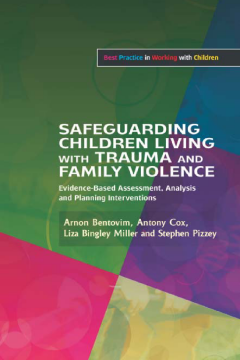
BOOK
Safeguarding Children Living with Trauma and Family Violence
Stephen Pizzey | Antony Cox | Liza Bingley Miller | Arnon Bentovim | Brigid Daniel
(2009)
Additional Information
Book Details
Abstract
Offering a systematic approach to evidence-based assessment and planning for children living with trauma and family violence, this practical book shows how to assess and analyse the needs of the child, make specialist assessments where there are continuing safeguarding concerns (using the Assessment Framework) and plan effective child-centred and outcome-focused interventions.
The authors analyse the impact of exposure to a climate of trauma and family violence on a child's bioneurological development and on their capacity to form attachments and to develop and reflect on relationships through childhood and adolescence into adulthood. They bring together the assessment of children in need with the evaluation of significant harm and risk, and potential for rehabilitation, and also explore the application of evidence-based approaches to intervention.
This book is an essential tool for all front-line practitioners working with child protection, including social workers, child and adolescent mental health practitioners, police officers, probation workers and domestic violence organizations. It is also suitable for undergraduate, postgraduate and post-qualifying students.
The collaborative book, by two very senior child psychiatrists and two distinguished independent social worker, is richly referenced, illustrated with apposite case examples and threaded with clearly tabulated, systematic guidelines to the analysis and evaluation of data concerning children who live with trauma and family violence…...I hope, however, that this title will be widely read and re-read... this is a book to be acclaimed, widely used, evaluated for therapeutic work and as a building block for the devilment of future research projects.
Child and Adolescent Mental Health
Social workers and their managers will find this helpful, and any work that aims to provide practitioners with tools to assist them in this complex task will be welcomed. In the post-ICS compliance world, workers are eager to get back to the task of producing quality assessments and this book will make some contribution to that process.
British Journal of Social Work
This book will be used as a Social Work teaching tool for many years to come and much coveted by the profession. This book is exceptionally good value... These authors are simply some of the best in their field, not solely academics, but facing the challenges as practitioners of meeting dysfunctional families on a day-to-day basis... The ingredients of such expertise result in timely and essential reading for all children's social workers and policy makers... This would be invaluable for social workers of all levels of experience... this book will be used as a teaching tool for many years and much valued by the profession.
Seen and Heard
This is a book which, refreshingly, is both scholarly and of great practical use.
Young Minds
Arnon Bentovim is Honorary Consultant Child and Adolescent Psychiatrist to the Great Ormond Street Children's Hospital and the Tavistock Clinic. He is also Honorary Senior Lecturer at the Institute of Child Health, University College London. Antony Cox is Emeritus Professor of Child and Adolescent Psychiatry at Guy's, King's and St Thomas' School of Medicine, London. Liza Bingley Miller is an independent social work consultant and National Training Coordinator of Child and Family Training, as well as being the Adoption Panel Chair for the North Yorkshire Children and Young People's Services. Stephen Pizzey is an independent social worker.
Table of Contents
| Section Title | Page | Action | Price |
|---|---|---|---|
| 1. Introduction: Why uncertainty? Why listen to marginalised youth? | |||
| 2. Key concepts | |||
| 3. Youth-centred research and uncertainty: Method and approach | |||
| 4. Ethiopia context and themes | |||
| 5. Rural Fogera: Land shortages, adult status and migration | |||
| 6. Urban Woreta: Migrating in to street situations | |||
| 7. Drought-prone Hetosa: Status, success and migration | |||
| 8. Addis Ketema: Identity and support in street situations | |||
| 9. Nepal: Context and themes | |||
| 10. Rural Kapilvastu: Discrimination and uncertainty | |||
| 11. Rural Kapilvastu: Dealing with change and tradition | |||
| 12. Sindhupalchowk: Environmental fragility, youth responsibilities and migration in rural Nepal | |||
| 13. Kathmandu: Environment vulnerability, slums and family-support | |||
| 14. Genderfluidity: LGBTQI & third gender in Kathmandu | |||
| 15. Policy themes and impact: Introduction | |||
| 16. Conclusion: Listening to marginalised youth on uncertainty |
